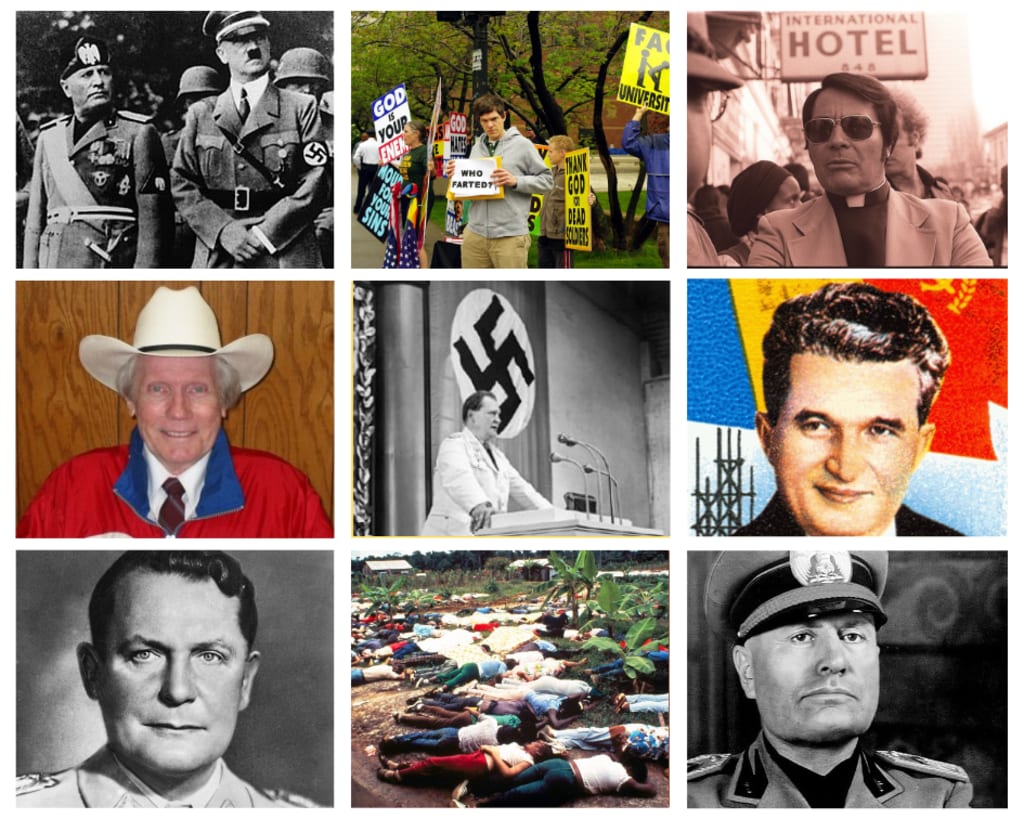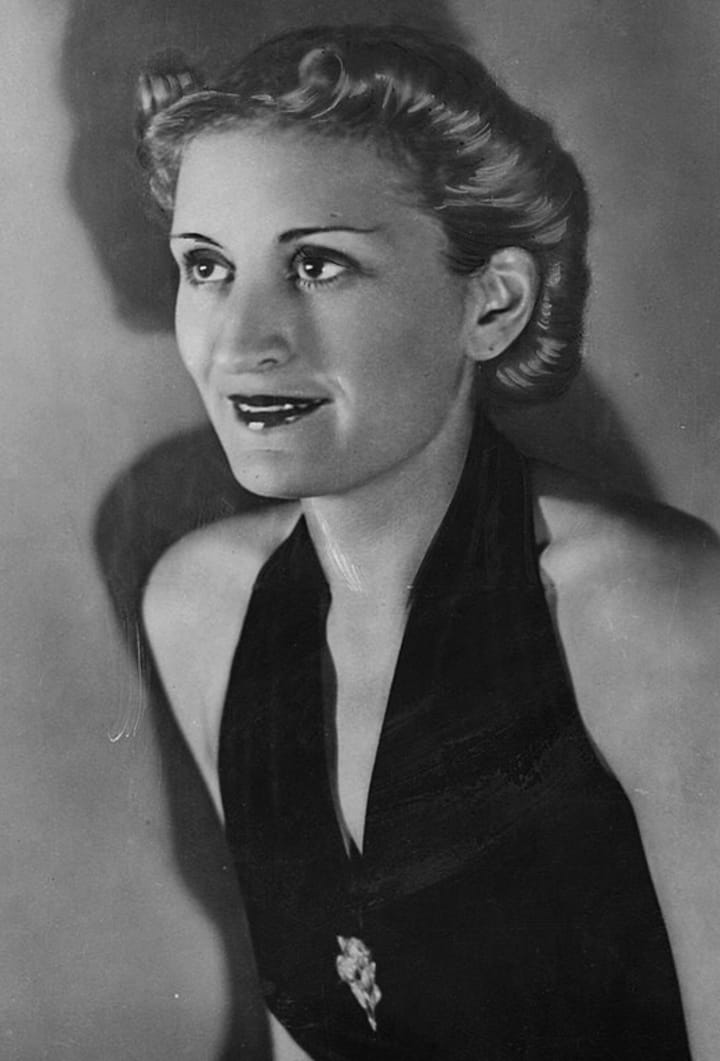What Happened To The Children Of History's Most Evil Men?
Does evil run through their blood?

Nathan Phelps
Nathan Phelps (born in 1958) is the son of Westboro Baptist Church Pastor Fred Phelps (1929–2014), who earned notoriety for his demonstrations at funerals around the United States. Nathan, the sixth of thirteen children, was thought his father's radical interpretation of Calvinism from an early age. Extreme physical punishments and abuse were complimented by harsh nutritional and health standards and other excessive expectations.
Not able to take any more, on his eighteenth birthday, Nathan left home at midnight and moved to California, where he began a new life apart from his family.
The Kansas-based Westboro Baptist Church (WBC) rose to prominence in the United States and abroad for its practice of picketing funerals, primarily of service members killed in the Afghanistan or Iraq wars. The hate group also espoused antisemitic and xenophobic sentiments, and picketed the funerals of famous figures to preach a virulently anti-gay message under the slogan "God Hates Fags."

Nathan now identifies as an atheist and currently lives in Alberta, Canada. He spends his days providing public speeches at gatherings that advocate awareness of child abuse related to religion, atheism, skepticism, and secularism. He also sees himself as an LGBT activist and has spoken at several Gay Pride events.
Edda Mussolini
Edda Ciano née Mussolini (1910–1995) was the first-born and favorite of Italian dictator Benito Mussolini's (1883–1945) five children.
Described as a powerful woman who defied expectations, Edda would turn heads by dressing in slacks, smoking, and drinking like a man. True to character, she was one of the first Italian women to drive an automobile while wearing trousers.
Edda was touted as the perfect "new woman" for the Italian Fascist regime in her younger days. She was a wife, mother, and an attractive, sporty, ardent, and enthusiastic supporter of Benito Mussolini's aggressive policies and partnership with the Nazis.
Just shy of her 20th birth, she became Edda Ciano, Countess of Cortellazzo and Buccari, after marrying the fascist propagandist and Italian Foreign Minister Galeazzo Ciano.
Unfortunately for the married couple, Galeazzo Ciano (1903–1944) voted against his father-in-law in the Fascist Grand Council in July 1943, when internal resistance to Benito Mussolini finally arose. Despite pleas for mercy from Edda, the Italian dictator had Galeazzo Ciano arrested for treason, and subsequently tried, and hanged on January 11, 1944, for his role in the planned overthrow.
After the execution of her husband, Edda disavowed her father and the family name.
A year later, Edda was deported to Lipari, part of Sicily's Aeolian archipelago, in 1945, following the fall of fascism and her father's execution. She was a frail, pale widow who was miserable and sorrowful. Nevertheless, despite her circumstances, her youthful beauty shined through.

Edda's presence surprised residents, especially Leonida Bongiorno, an attractive, blue-eyed, and fearless regional communist leader who became enamored with Edda's beauty and personal drama. The two soon began having an affair, transforming Edda's ten-month prison sentence into a fleeting moment of happiness.
Edda Ciano returned to Rome after the war and settled down. In 1975, she published "My Truth," a memoir filled with fascinating anecdotes about Benito Mussolini and Galeazzo Ciano.
Two decades later, Edda died on April 9, 1995, in Rome, at the age of 85.
Nicu Ceausescu
Nicu Ceausescu (1951–1996) was the youngest son of Romanian dictator Nicolae Ceausescu (1918–1989), a Communist politician who led Romania from 1965 until 1989. Despite being the youngest child, Nicu had been groomed as his father's successor before a violent revolution deposed Nicolae's tyranny, leading to a dramatic conclusion on Christmas Day, 1989. A firing squad killed the dictator and his wife Elena (1916–1989) for crimes against humanity.
This uprising spelled trouble for Nicu, as Nicu had gotten away with womanizing, drunk driving, heavy gambling, and abusing women over the years due to his father's total power.
Shortly before Romania's December 1989 uprising, Nicu served as the Communist Party secretary of Sibiu. This old medieval town was home to Nicu's retinue of servants, sex slaves, bodyguards, and hangers-on, who partied at the neighboring fortress of Saliste Paltinis and traveled around Romania eating caviar, drinking champagne, and raping whomever they pleased. Nicu's playboy lifestyle, set against a backdrop of abject poverty and food scarcity for most Romanians, symbolized his father's regime.
When rage erupted on the streets of multiple Romanian cities in late December 1989, Nicu feared for his life. He ordered the Securitate and army units to fire on the masses in Sibiu. A total of 89 persons were killed, with another 219 injured. Nicu was apprehended, beaten, and stabbed by enraged assailants.
He survived the attack, and the next year, Nicu Ceausescu was convicted of instigating murder by a military court, stemming from his deployment of lethal force against anti-government protestors during Romania's 1989 December rebellion.
True to his nature, Nicu would claim he was too drunk to recall the events of the day when he was tried for ordering the slaughter in Sibiu; later, he admitted to delivering the order, but only as a joke.
While prosecutors in Romania initially charged him with genocide, the accusation was later reduced to "instigation of aggravated murder." He was found guilty and sentenced to 20 years in prison. In November 1992, however, he was discreetly freed for good behavior after the case against him was lowered to simply illegal possession of firearms. His sentence was reduced to five years.
Four years after his release from prison, the dictator's son would die from cirrhosis of the liver, most likely caused by years of heavy drinking.
Stephan Gandhi Jones
Stephan Gandhi Jones (born in 1959) first arrived in Jonestown in February 1977, when he was roughly 17 years old, to assist in constructing his father's compound.
Stephan's father, Jim Jones (1931–1978), founded the Peoples Temple in Indiana, USA, in the early 1950s. A remarkedly progressive individual, Jim Jones preached social justice, racial and economic equality and promoted desegregation in his new religious movement.
Jim Jones relocated the organization to California in the 1960s, and the group grew to roughly 100 members. He subsequently ramped up his recruitment efforts, founding a People's Temple branch in San Francisco, before purchasing land in Guyana, a small South American country.
Stephan was not present when his father's settlement, Jonestown, was decimated by a cyanide-laced punch on November 18, 1978. The mass suicide - murder killed over 900 people, of which over 300 were children. Stephan had managed to escape death with the Jonestown basketball team, who were participating in a tournament in Georgetown, Guyana, roughly 150 miles from Jonestown.
On the day of the massacre, Jim Jones radioed his son, instructing him to return to Jonestown. Stephan Jones refused, arguing that leaving would be an insult to the Guyanese government, who after all, had agreed to lease 12 square kilometers of land for Jim Jones's Peoples Temple Agricultural Project in 1974. Thus, Stephan and his team members were still in Guyana's capital during the mass suicide. The game ended in a ten-point loss for Peoples Temple.
Stephan, 19 at the time, was arrested after the massacre on allegations of aiding and abetting mass murder and spent three months in a Guyanese prison before the case against him was dismissed.
Nowadays, Jones claims to be enjoying a happy life in the United States with his wife and three daughters after years of struggles, including drug addiction. He works as an executive at an office furniture company.

In the over 40 years since the Jonestown, Stephan has been willing to give media interviews regarding the organization and massacre. He was featured in the History Channel's 2007 documentary Jonestown: Paradise Lost and has written for the San Diego State University-run website Alternative Considerations of Jonestown & Peoples Temple. Stephan claims that striving to relate the memories of individuals who lived at Jonestown helped him heal.
Edda Carin Wilhelmine Göring
Edda Carin Wilhelmine Göring (1938–2018) was the sole child of German politician, military leader, Hermann Göring (1893–1946).
As Adolf Hitler's intended successor and a vital member of the Nazi party, Hermann Göring is well known as the commander of the German Luftwaffe during World War II, president of the Reichstag, and head of the Gestapo.
From the moment she was born, Edda Göring was a local celebrity. The "Shirley Temple of Nazi Germany" grew up in a beautiful countryside manor in Carinhall with priceless, looted art and wealth at her feet. Her godfather was Adolf Hitler, and national celebrations marked her birth.
However, when the Allies defeated the Nazis in 1945, her idyllic adolescence came to an end. After the war, Hermann Göring was apprehended and tried at the Nuremberg trials for war crimes and crimes against humanity. The night before he was to be hanged, he took cyanide and committed suicide. Edda was just eight years old.
In the years after her father's death, Edda was unabashedly open about her sentiments towards her father. For Gerald Posner's book "Hitler's Children: Sons and Daughters of Third Reich Leaders," she expressed that her only recollections of her father were him being very loving, and she could not see him any other way.
In the same interview, Göring downplayed her father's role in the Holocaust, even though most historians believe he was crucial in carrying out plans to murder millions of people, including around 6 million Jews:
"My father's problem was his loyalty to Hitler," she said. "He had sworn personal fealty to him and would never abandon it, even when Hitler had gone too far. The things that happened to the Jews were horrible but quite separate from my father."
In 2014, Edda unsuccessfully petitioned German authorities in Bavaria for a portion of her father's possessions, many of which he looted during WWII. The local parliament denied her appeal after only a few minutes of debate.
On December 21, 2018, Edda Göring died at the age of 80 from unknown causes. According to German media, she was discreetly buried in an unmarked grave in Munich.
About the Creator
Chelsea Rose
I never met a problem I couldn't make worst.






Comments
There are no comments for this story
Be the first to respond and start the conversation.